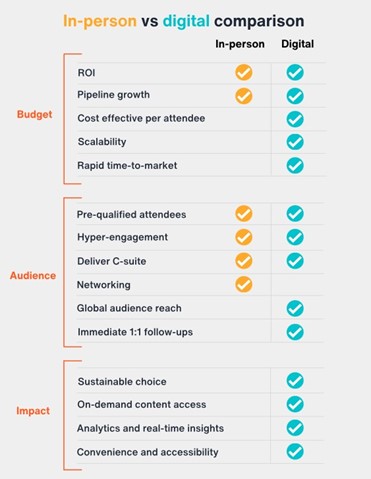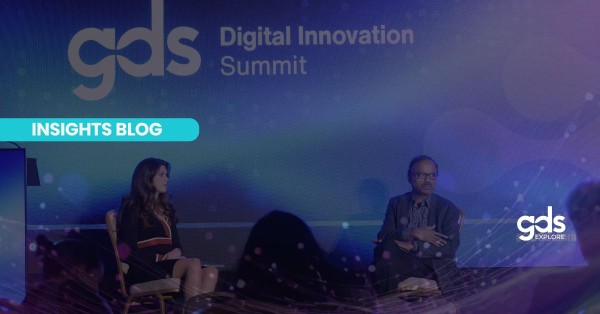Table of contents:
| In brief | 1 |
| 1. Cost/ROI | 2 |
| 2. Revenue generation | 3 |
| 3. Audience | 3 |
| 4. Time | 4 |
| 5. Analytics | 5 |
| 6. Sustainability | 6 |
| Future | 7 |
| Conclusion | 7 |
| GDS Group | 8 |
| Key findings at a glance | 8 |
In brief:
- Digital event experiences offer a cost-effective and accessible alternative to in-person events for B2B businesses
- Digital event experiences create higher ROI, wider audience reach and flexible revenue generation opportunities
- Digital event experiences excel in time savings, flexibility and adaptability
- Sustainability, as a main concern for many businesses, is a huge consideration when looking into digital versus in-person event experiences
- Digital events offer a remarkable reduction of 60-98% in total climate pollution compared to in-person events, making them a sustainable
- Leveraging technology is crucial for businesses to drive growth and engagement in the evolving landscape of event experiences
In-person event experiences have been a staple for B2B businesses for years. From objectives such as networking and showcasing brand and/or product, to pipeline growth and customer acquisition, events are a top marketing tactic for 44% of CMOs.
During the COVID-19 pandemic, in-person events had to be canceled or postponed, leading to a surge in the popularity of digital events for B2B businesses.
Since then, many organizations are now questioning whether to continue investing in more traditional in-person events or shift their focus entirely to digital events. In this article we will be looking into 6 key areas in which we can compare digital and in-person events from a B2B business perspective, to make the best decision for your business.
1. Cost/Return On Investment (ROI)
An event experience provides businesses with the unique opportunity to drive revenue generation, enhance brand awareness and connect with clients and partners to transform business opportunities.
With the average in-person event costing nearly 50% more than a digital event it’s little wonder that 84% of organizations think that digital events are more cost-effective than in- person events.
With 31% of marketers believing that event marketing is the single most effective marketing channel for achieving business objectives, it’s clear that the events industry still holds a prevalent place in the world of B2B business.
Whether attending or hosting events, the digital approach makes it more feasible for smaller businesses to reach a wider audience without breaking the bank. For those larger companies, ROI and margins for digital versus in-person events is critical.
66% of event experience organizers say that digital event experiences provided a greater ROI than in-person. This can be attributed to various reasons, however, one key indicator is 68% of attendees re-watch content from digital event experiences they’ve attended. The ability to stay with your audience even, after the event has ended, is a powerful tool to drive growth for your business.
Cost/Roi verdict

2. Revenue generation
Generating revenue is key to any business and hosting event experiences for potential clients and/or partners is a proven strategy for driving revenue. 73% of marketers experience a demand-gen boost with excellent digital event experiences, allowing B2B businesses to nurture those key relationships through engagement and interaction.
The opportunities that digital events provide for monetization, include sponsorship and advertising arrangements, can be agreed and can lead to mutually beneficial exposure to the audience. Technology has enabled businesses to host interactive digital spaces, such as virtual booths or exhibition spaces, allowing brands to showcase their products or services and generate leads. The addition of compelling content, exclusive sessions or digital workshops can create additional revenue streams for businesses.
In-person events, on the other hand, present their own revenue-generating possibilities. With the advantage of face-to-face interactions, more immediate sales and business partnerships can come to fruition. Brands can engage attendees directly, demonstrate products or services and close deals on the spot. In-person events often have a higher ticket price compared to digital events, providing an opportunity for direct revenue generation from ticket sales.
Revenue generation verdict

3. Audience
Audience acquisition is one of the biggest differentiators when comparing the two event types.
With 40% of event planners saying that the biggest challenge in event marketing is reaching new attendees, digital event experiences can alleviate this challenge, bringing brands to more people. Not only more people but the right people, at the right time. A key tool advantage when 43.3% of marketers agree that engaging with their target audience is their primary goal for digital event experiences.
Reaching your target audience and getting them in front of your content has always been a challenge, especially when asking them to commit to a ticket cost upfront. However, digital events allow you to be more targeted and the numbers speak for themselves:
From 2020 to 2023, our digital experiences witnessed an astonishing attendance of 34,473 senior executives, eclipsing the 3,124 attendees at our in-person events. With a staggering 75% rate, digital outshines in-person event experiences by securing nearly twice the number of top C-level executives in-person is just 40%.
Another advantage of digital events is their flexibility. With in-person events, once the venue, date, and time are set, it can be difficult to make changes or adjustments. However, with digital events, changes can more easily be made to the schedule, speakers or format up until the day of the event. Additionally, digital events can be recorded and made available on-demand, which allows attendees to re-watch sessions they may have missed or revisit content they found particularly valuable.
Following up with attendees can often be where the deals are made and partnerships align. Without a structured way of keeping these contacts engaged, there is a risk of the deal dissipating. Between 2020 to 2023, our digital event experiences generated an impressive 84% conversion rate of qualified leads into 1:1 follow-up meeting, with dedicated support from our teams. In contrast, in-person event experiences yielded a 16% success rate.
With a larger target audience, the business opportunities are numerous. Digital events have enabled businesses to evolve creative ways to bring personal interaction, so attendees make valuable connections and build relationships with industry professionals. The enduring question is – are digital experiences as engaging/immersive/personable as an in-person event?
Of course, one drawback of digital events can be the lack of personal interaction. In-person events provide valuable opportunities for attendees to network, meet potential clients, and build relationships with other professionals in their industry. These interactions can lead to long-lasting business partnerships and opportunities. Additionally, attendees may feel more engaged and invested in an event when they are physically present, which can lead to a more positive experience overall. Innovation plays a crucial role in enhancing digital event experiences to replicate the level of engagement found in in-person events. By leveraging strategies such as gamification, live polling, and immersive environments, organizers can captivate their audience and make them feel fully immersed in the action. These elements are what set GDS event experiences apart from the rest.
Audience verdict

4. Time
The old adage “time is money” is even more true in a world where technology and innovation continue at a relentless pace.
From time to market to employee time – time can be key to business success. Digital events are fast – saving time for businesses but also cost through speed. Between 2020 and 2023 our digital event experiences saved a total of 120,656 hours for senior executive attendees by eliminating the need to travel (based on an average travel time of 3.5 hours), and 40,401 hours saved for our partners on travel hours. Just think how much business could be created and progressed in that time!
Setting up a digital event experience takes time but the time difference between setting up digital versus in-person event experiences is vast. Simply selecting a venue and date can take upwards of 10-20 hours whereas with a digital event provider the ‘venue’ is ready to use.
From an attendee perspective, you also see the time savings, another reason more people attend digital events – no need to book hotels months in advance, when attending from the comfort of your home. Logistics become reduced to attending on time. The ability to watch the recorded content also saves the audience time as they won’t necessarily have to rely on their own notes.
Time spent at an in-person event can seem higher in quality when networking face-to-face. Digital fatigue is being discussed now that the pandemic has lessened its grip on the world. How do we ensure audiences are engaged and not distracted by a chat message, an email, a child entering the room etc. In-person events eliminate some of these challenges and help maintain focus for your audience. When looking at digital event experiences and enhancing them to keep audience attention engaged, interaction such as gamification and live polling keep your audience involved. With immersive digital environments audiences feel fully a part of the action.
Time verdict

5. Analytics
Do you know how many people are actively listening in a conference? Can you tell when they are looking at promotional material provided to them? Do you know the names of who put their hands-up to questions or a survey?
These are just some examples of metrics you may want to look at when measuring the success of an event experience. Whilst these may be hard to measure when hosting an in- person event experience, with digital event experiences these metrics become tangible.
From monitoring audience engagement behind the scenes, to providing content your audience they can take away and read again in their own time along with setting follow-ups immediately, digital event experiences provide business metrics you can measure against your own KPIs.
The growing need for richer audience insights to support account expansion requires technology and this is something that can be easily accessed through digital event experiences. Considering 36% of marketers selected ‘increased ROI’ as the top benefit for hosting digital event experiences, with technology and tracking being key to successful KPI measurement, then it’s clear how digital events and technology can help in this challenge.
Analytics verdict

6. Sustainability
Digital events have emerged as a sustainable alternative to traditional in-person events and the advantages they offer are undeniable. With 83% of organizations prioritizing sustainability when planning meetings and events, digital experiences are the clear winner.
Digital event experiences provide a remarkable reduction of 60-98% in total climate pollution compared to in-person events. This statistic highlights the immense potential of digital events in mitigating carbon emissions and combating climate change.
Moreover, one of the greatest advantages of digital events lies in their enhanced accessibility. Unlike in-person events that require travel, digital event experiences allow attendees from all around the globe to participate from the comfort of their homes or offices. This accessibility not only makes it easier for individuals to attend events but also fosters a more diverse and inclusive audience. By eliminating the need for travel, digital events also reduce the carbon footprint associated with transportation and accommodation.
The positive environmental impact of digital events becomes even more apparent when considering the cost savings they offer. The GDS digital event experiences, for example, saved senior executives and partners the expenses equivalent to 46,016 flights between 2020 and 2023. This substantial reduction in travel costs is just one way in which digital events outperform their in-person counterparts. Additionally, digital events eliminate the need for physical venues, construction, transportation and catering, further reducing the financial burden of sending employees to events.
When looking at sustainability, there are other impacts to be considered as well as carbon footprint etc. In-person events can promote local economies and support local businesses. When events are held in a specific location, attendees often patronize local hotels, restaurants, transportation services, and other businesses, boosting the regional economy. This economic stimulation can have a positive impact on job creation and community development, contributing to sustainability on a local level.
Another consideration is the potential environmental impact of the digital infrastructure required to host digital events. While streaming experiences may reduce carbon emissions associated with travel, the energy consumption and electronic waste generated by the necessary technological infrastructure should be considered. It all comes down to balance, and on balance digital event experiences create far lower carbon impacts than in-person events.
Sustainability verdict

Future
The future of events experiences is in a state of flux. Whilst 91.7% of our event experiences have been digital since 2020 senior leaders are evolving their audience acquisition and engagement strategies. This is as a result of the shift to hybrid working and growth of AI, in- person events are starting to pick up momentum again.
What does this mean for your business? Considering the insights we’ve shared, it seems that digital advantages overall outweigh in-person events – but how about meeting in the middle? According to a survey, 90% of event professionals plan to host hybrid events in 2023, and 81% believe that hybrid events will become the norm in the future.
Will hybrid events bridge the gap and bring the best of both worlds together or will they cause extra work, confusion, cost, and confused metrics?
Whilst these questions currently remain unanswered, the bottom line is certainly clear – 86% of marketers believe that technology has a major positive impact on event experience success. With technology innovation, such as AI, our immersive digital events remain market leaders.
Conclusion
In conclusion, the comparison between digital and in-person event experiences for B2B businesses reveals several key insights. Digital events offer cost savings and a higher ROI compared to in-person events. They provide accessibility to a wider and more diverse audience, allowing businesses to reach their target market effectively. While in-person events offer face-to-face interactions and immediate revenue generation opportunities, digital events excel in flexibility, adaptability and the ability to generate revenue through sponsorship, advertising and compelling content.
Time savings are evident with digital events, eliminating the need for travel and providing a streamlined set-up process. However, in-person events can offer a higher quality networking experience. Digital events also provide measurable analytics and insights, enabling businesses to track audience engagement and measure success against KPIs. Looking towards the future, hybrid events are gaining popularity, combining the benefits of both digital and in-person experiences. Ultimately, technology plays a significant role in enhancing event experience success, and businesses should consider leveraging its potential to drive growth and engagement.
GDS Group
GDS Group are a global B2B solution provider, specializing in helping businesses connect with their desired audiences to drive higher return on expectations for pipeline growth and transformation. With 30 years of expertise, we’ve become our clients’ pipeline partner, providing real-life, real-time insights through innovative digital and face-to-face environments. Leading brands trust us to deliver pioneering immersive experiences, unparalleled access to industry thought leadership and unique creative content and production services to help solve challenges and accelerate their projects.
Key findings at a glance









